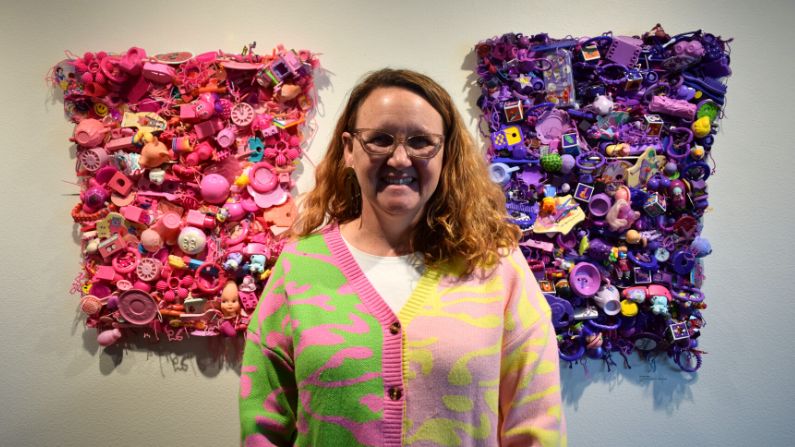Colorado-based artist Elizabeth Morisette has been exhibiting weavings and sculptures she creates from repurposed materials for over 25 years. Morisette is a graduate of North Carolina State College of Design and also holds a master’s degree from the Maryland Institute College of Art. She currently works as the education coordinator at the Museum of Art in Fort Collins, Colorado.
Morisette’s colorful tapestries, made entirely from what she describes as “upcycled” materials, can be experienced at the theater gallery in the Center for the Arts now through June 10. KHOL’s conversation with Morisette was recorded live on May 13.
The following interview transcript has been edited for clarity and brevity.
JACK CATLIN/KHOL: You said that you see your work as a reflection of our times, a kind of snapshot of who we are right now. How so?
ELIZABETH MORISETTE: By the items that are there. There’s a piece that’s made out of slides, transparent slides, that used to be something that whenever anybody went out on a vacation, they’d bring home the slides and then you’d sit around and watch the slide projector show and they’d tell you about their trip. Now, it’s all instant on Instagram or Facebook. So, I think there might be people who come through the gallery and don’t know, have never seen slides and don’t know what they are, and probably don’t know what I’m talking about right now. So, that’s kind of a reflection in that they’re still here. They’re plastic. They’re not going anywhere. So, it’s part of our history. It’s part of who we are. So, it kind of tells people about that.
I have a piece that’s made out of plastic rollers that every time it’s shown, people have cool stories that I love to listen to. Like there’s a mom that’s talking to her daughter and saying, ‘Your grandma used to make me wear those on Saturday night before we’d go to church on Sunday.’ And it’s a feeling that like her head hurts when she looks at the piece. So, it’s telling stories but it’s also reflecting on who we are and how the stuff that’s in our lives really kind of defines us in a way. And it might just be a momentary definition, but it kind of sticks with us.
KHOL: You’ve also stressed the significance of the memories attached to the pieces you create, that your work is a conversation with materials. I thought that was very interesting. Can you touch on how much memories and/or emotions contribute to your process?
MORISETTE: Most of the time the things that I use in my piece are not my own. Sometimes they are, but most of the time they’re not. So, it’s kind of like I’m responding to the piece with my own memory, my own sentimentality, you might say. And then I drill holes into them and I put them through this whole process, and then they hang on the wall, and then it becomes a different piece. So, people are going to approach these different ways. Some people might just be like, ‘Woo, cool colors.’ Other people might be sentimental, and other people might see kind of the bigger idea of like, ‘Oh my gosh, this is all junk that was on its way to the landfill.’ Like, I only took a fraction of what’s going to the landfill on a daily basis. So there are different levels that you can look at the pieces, and it’s up to the viewer to decide. I just put it out there and I’m like, ‘Here you go. This is it. This is something that you need to kind of think about.’ And whatever level you want to think about it, that’s fine with me.
KHOL: And what do you hope local Jackson viewers will take away from the collection?
MORISETTE: What do you have around your house that you could reuse, that you could make into something else? And it doesn’t have to be a wall hanger. It doesn’t have to be a piece of art. But could you make it into a basket? Could you make it into a necklace? Could you make it into a pair of earrings and then, like, just take it and give it a little bit extra life beyond just throwing it out? I want everybody to look at my pieces and be like, ‘What if?’ about their own kind of things, their own sentimental things that they have around. And how can I make it something more than just that memory for me, but a memory for other people as well?
Listen above for KHOL’s full conversation with Elizabeth Morisette.
This coverage is funded in part with an Arts For All grant provided by the Town of Jackson and Teton County.






